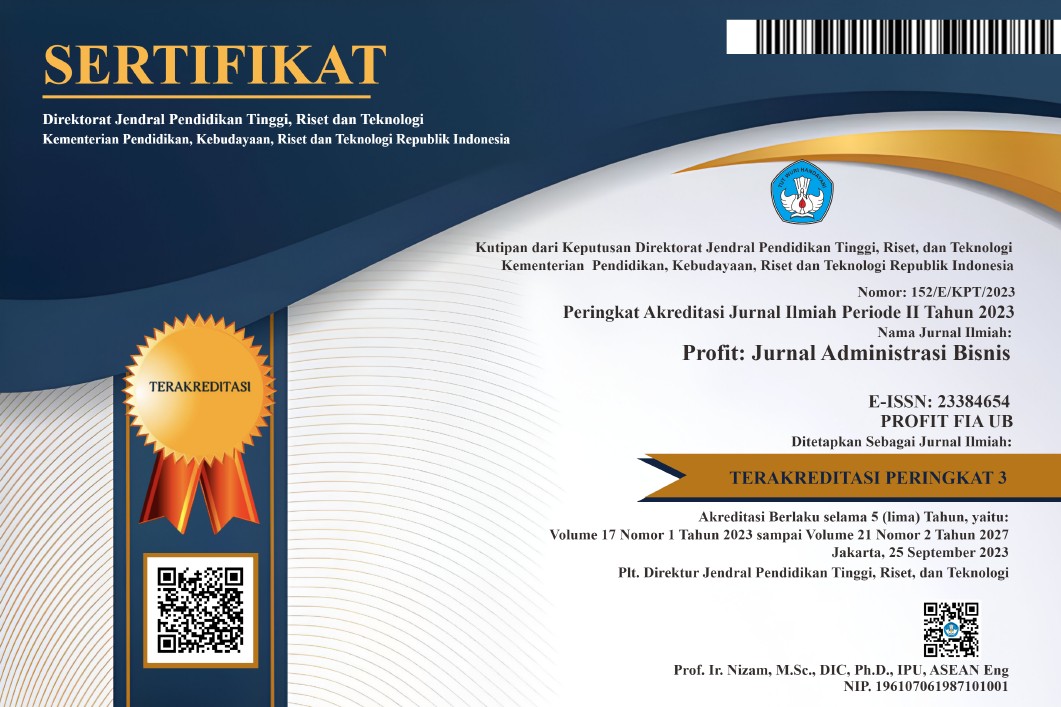ECOLODGE SEBAGAI SARANA AKOMODASI PARIWISATA BERKELANJUTAN
DOI:
https://doi.org/10.21776/ub.profit.2021.015.01.4Keywords:
Ecolodge, Ecotourism, Sustainable TourismAbstract
Ecotourism needs accommodation that simple, comfortable, provides unique nature experience, and of course ecologically acceptable. Ecolodges is one of the options for tourist who wants their accomodation to be environmentally friendly. That is why, ecolodge needs to be managed with sustainability principles. This literature review uses a systematic literature review approach. Empirical articles on the topic of ecolodge published between 2009 and 2019 were obtained from three reputable journal portals, totaling 56 articles. The articles are reduced to nine articles which are empirical articles, in English, and having ecolodge as the object of their research. The purpose of this literature review is to see the results of Ecolodge related research that has been conducted. This paper finds that several studies highlight the importance of standardization, solid governance, and partnership for ecolodge development. Other researches addresses the importance of local communities' perception and their capacity building development. Some studies also specifically address ecolodge as a form of indigenous tourism. Findings from several studies also indicate the importance of consumer satisfaction for effectiveness and efficiency in ecolodge management. This paper suggests that in future research directions should be conducted with more involvement from other stakeholders to evaluate ecolodge performance in various aspects.
References
Beaumont, N. (2011). Ecotourism: impacts, potentials and possibilities. Annals of Leisure Research, 14(4), 390–392. https://doi.org/10.1080/11745398.2011.639443
Blangy, S., & Mehta, H. (2006). Ecotourism and ecological restoration. Journal for Nature Conservation, 14(3–4), 233–236. https://doi.org/10.1016/j.jnc.2006.05.009
Bohdanowicz, P. (2005). European hoteliers’ environmental attitudes: Greening the business. Cornell Hotel and Restaurant Administration Quarterly, 46(2), 188–204. https://doi.org/10.1177/0010880404273891
Braithwaite, V. (1997). A Social Values Segmentation of the Potential Ecotourism Market. Article in Journal of Sustainable Tourism. https://doi.org/10.1080/09669589708667274
Buckley, R. (2010). Conservation tourism. In Conservation Tourism.
Bulatović, D. S. D. (2017). Ecotourism and Ecolodge Accommodation. ILIRIA International Review, 7(2). https://doi.org/10.21113/iir.v7i2.331
Caroline Ashley and Elizabeth Garland. (1994). Number 4 October 1994 PROMOTING COMMUNITY-BASED TOURISM DEVELOPMENT Why , What and How ? by Caroline Ashley and Elizabeth Garland. 4.
Cheers, B., Cock, G., Keele, L., Kruger, M., & Trigg, H. (2005). Measuring community capacity: An electronic audit tool. http://www.academia.edu/download/7642249/cheers_et_al.pdf
Cheng, A., Lu, C., & Chiappa, G. Del. (2016). The Influence of Materialism on Ecotourism Attitudes and Behaviors Senior tourists View project Emotional segmentation View project. Journal of Travel Research, 1–14. https://doi.org/10.1177/0047287514541005
Craig Wight, A., & John Lennon, J. (2007). Selective interpretation and eclectic human heritage in Lithuania. Tourism Management, 28(2), 519–529. https://doi.org/10.1016/j.tourman.2006.03.006
Crotts, J. C., Mason, P. R., & Davis, B. (2009). Measuring guest satisfaction and competitive position in the hospitality and tourism industry: An application of stance-shift analysis to travel blog narratives. Journal of Travel Research, 48(2), 139–151. https://doi.org/10.1177/0047287508328795
Deng, J. (2007). The New Environmental Paradigm and Nature-Based Tourism Motivation park, recreation and tourism View project Claude Worthington Benedum Foundation_Tucker County Tourism Planning View project. Article in Journal of Travel Research. https://doi.org/10.1177/0047287507308331
Ellis, C. (2003). Participatory Environmental Research in Tourism: A Global View. Tourism Recreation Research, 28(3), 45–55. https://doi.org/10.1080/02508281.2003.11081416
Elrouby, I. (2016). Ecolodging as an Answer for Sustainable Development and Successful Resource Management - The Case of North West Coast in Alexandria. 2016(8), 2839–2851.
Fennell, D. A. (2006). Evolution in tourism: The theory of reciprocal altruism and tourist-host interactions. Current Issues in Tourism, 9(2), 105–124. https://doi.org/10.1080/13683500608668241
Fennell, D., & Dowling, R. (2003). Ecotourism policy and planning. https://books.google.com/books?hl=en&lr=&id=ywH2jUwOCfkC&oi=fnd&pg=PR9&dq=Fennell,+D.+A.,+%26+Dowling,+R.+K.+(Eds.).+(2003).+Ecotourism+policy+and+planning.+CABI.&ots=tCxzqgmEI-&sig=nsKkFqGZv8iLzHTuOEhRKPIQEfw
Hall, C. M., Dayal, N., Majstorović, D., Mills, H., Paul-Andrews, L., Wallace, C., & Truong, V. D. (2016). Accommodation consumers and providers’ attitudes, behaviours and practices for sustainability: A systematic review. Sustainability (Switzerland), 8(7), 1–30. https://doi.org/10.3390/su8070625
Hawkins, D., tourism, M. K.-G., & 1998, undefined. (n.d.). 11 Ecotourism opportunities for developing countries. Books.Google.Com. Retrieved October 1, 2019, from https://books.google.com/books?hl=en&lr=&id=d9UrBgAAQBAJ&oi=fnd&pg=PA191&dq=Hawkins,+D.+E.,+%26+Khan,+M.+M.+(1998).+11+Ecotourism+opportunities+for+developing+countries.+Global+tourism,+191.&ots=dx9FXpNi8H&sig=9bO2oP7CQahHiEDFHM5avkHvVek
Heather, Z. D. (2006). Indigenous ecotourism: Sustainable development and management. In Indigenous Ecotourism: Sustainable Development and Management. https://books.google.co.id/books?hl=en&lr=&id=noFNSuofi6IC&oi=fnd&pg=PR5&dq=Zeppel,+H.+(2006).+Indigenous+ecotourism:+Sustainable+development+and+management+(Vol.+3).+Cabi.&ots=kjq8nQmwEu&sig=wQRS8J-cjx60Up9BQfLSrV2hwSg&redir_esc=y#v=onepage&q=Zeppel%2C H
Higgins-Desbiolles, F., Trevorrow, G., & Sparrow, S. (2014). The Coorong Wilderness Lodge: A case study of planning failures inIndigenous tourism. Tourism Management, 44, 46–57. https://doi.org/10.1016/j.tourman.2014.02.003
Hinch, T., & Butler, R. (2009). Indigenous tourism. Tourism Analysis, 14(1), 15–27. https://doi.org/10.3727/108354209788970117
Holder, A. (2017). Identifying the relative importance of culture in Indigenous tourism experiences: netnographic evidence from Australia. https://doi.org/10.1080/02508281.2017.1316443
Honey, M. (2002). Ecotourism & certification: Setting standards in practice. https://books.google.com/books?hl=en&lr=&id=R0bfqTkfkb4C&oi=fnd&pg=PR11&dq=Honey,+M.+(Ed.).+(2002).+Ecotourism+%26+certification:+Setting+standards+in+practice.+Island+Press.&ots=OBsv6noU1G&sig=crq6GH5p_4EBB-ZHbQ5QmPg6AhA
Honey, M. (2008). Ecotourism and sustainable development: Who owns paradise? https://books.google.com/books?hl=en&lr=&id=Jw2hy_2E5nwC&oi=fnd&pg=PR5&dq=Honey,+M.+(2008).+Ecotourism+and+sustainable+development:+Who+owns+paradise%3F.+Island+Press.&ots=8qnWmVbbw7&sig=bBc_bWobfY-wRHMgkkaUa8y5J3Q
Hunt, C., & Stronza, A. (2011). Missing the forest for the trees?: Incongruous local perspectives on ecotourism in Nicaragua converge on ethical issues. Human Organization, 70(4), 376–386. https://doi.org/10.17730/humo.70.4.xj187458416w1gr8
Imbaya, B. O., Nthiga, R. W., Sitati, N. W., & Lenaiyasa, P. (2019). Capacity building for inclusive growth in community-based tourism initiatives in Kenya. Tourism Management Perspectives, 30(January), 11–18. https://doi.org/10.1016/j.tmp.2019.01.003
Ingribelli, J. (2012). Perception of Importance and Performance of Certified Costa Rican Ecolodges.
Keough, S. B. (2010). The wenhai ecolodge: A case study of culture and environment in southwest China. Focus on Geography, 53(2), 65–71. https://doi.org/10.1111/j.1949-8535.2010.00009.x
Kerstetter, D. L., Hou, J. S., & Lin, C. H. (2004). Profiling Taiwanese ecotourists using a behavioral approach. Tourism Management, 25(4), 491–498. https://doi.org/10.1016/S0261-5177(03)00119-5
Kiper, T. (2013). Role of Ecotourism in Sustainable Development. Advances in Landscape Architecture. https://doi.org/10.5772/55749
Kiteley, R., & Stogdon, C. (2016). What Is a Literature Review? In Literature Reviews in Social Work (pp. 5–22). https://doi.org/10.4135/9781473957756.n2
Lai, P. H., & Shafer, S. (2005). Marketing ecotourism through the internet: An evaluation of selected ecolodges in Latin America and the Caribbean. Journal of Ecotourism, 4(3), 143–160. https://doi.org/10.1080/JET.v4.i3.pg143
Lamers, M., van der Duim, R., van Wijk, J., Nthiga, R., & Visseren-Hamakers, I. J. (2014). Governing conservation tourism partnerships in Kenya. Annals of Tourism Research, 48, 250–265. https://doi.org/10.1016/j.annals.2014.07.004
Lemelin, R. H., Koster, R., & Youroukos, N. (2015). Tangible and intangible indicators of successful aboriginal tourism initiatives: A case study of two successful aboriginal tourism lodges in Northern Canada. Tourism Management, 47, 318–328. https://doi.org/10.1016/j.tourman.2014.10.011
LePree, J. (2009). Certifying sustainability: The efficacy of Costa Rica’s certification for sustainable tourism. Florida Atlantic Comparative Studies Journal, 11(2008–2009), 57–78.
Lu, W., & Stepchenkova, S. (2012). Ecotourism experiences reported online: Classification of satisfaction attributes. Tourism Management, 33(3), 702–712. https://doi.org/10.1016/j.tourman.2011.08.003
Meguro, T., & Inoue, M. (2011). Conservation goals betrayed by the uses of wildlife benefits in community-based conservation: The case of Kimana sanctuary in Southern Kenya. Human Dimensions of Wildlife, 16(1), 30–44. https://doi.org/10.1080/10871209.2011.531516
Mehta, H. (2002). International Ecolodge Guidelines. The International Ecotourism Society.
Mic, M., & Eagles, P. F. J. (2019). Cooperative branding for mid-range ecolodges: Costa Rica case study. Journal of Outdoor Recreation and Tourism, 25(September 2017), 113–121. https://doi.org/10.1016/j.jort.2017.12.001
Millar, M., Mayer, K. J., & Baloglu, S. (2012). Importance of Green Hotel Attributes to Business and Leisure Travelers. Journal of Hospitality Marketing and Management, 21(4), 395–413. https://doi.org/10.1080/19368623.2012.624294
Moscardo, G. (2008). Sustainable Tourism Innovation: Challenging Basic Assumptions. Tourism and Hospitality Research, 8(1), 4–13. https://doi.org/10.1057/thr.2008.7
Osland, G. E., & Mackoy, R. (2004). Ecolodge performance goals and evaluations. Journal of Ecotourism, 3(2), 109–128. https://doi.org/10.1080/14724040408668153
Park, D., international, R. N.-C. 3rd, & 2013, undefined. (n.d.). Relationship between destination image and loyalty: developing cooperative branding for rural destinations. Media.Bizwebmedia.Net. Retrieved October 1, 2019, from http://media.bizwebmedia.net/sites/146527/upload/documents/20-destinations-branding.pdf
Peluso, N. L. (1993). Coercing conservation?. The politics of state resource control. Global Environmental Change, 3(2), 199–217. https://doi.org/10.1016/0959-3780(93)90006-7
Puhakka, R., & Siikamäki, P. (2012). Nature tourists response to ecolabels in Oulanka PAN Park, Finland. Journal of Ecotourism, 11(1), 56–73. https://doi.org/10.1080/14724049.2011.647917
Rathnayake, R. M. W. (2016). Willingness to pay for a novel visitor experience: ecotourism planning at Kawdulla National Park in Sri Lanka. Tourism Planning and Development, 13(1), 37–51. https://doi.org/10.1080/21568316.2015.1074095
Ruhanen, L. (2019). The prominence of eco in ecotourism experiences: An analysis of post-purchase online reviews. Journal of Hospitality and Tourism Management, 39(April), 110–116. https://doi.org/10.1016/j.jhtm.2019.03.006
Ryan, C., & Aicken, M. (2005). Indigenous tourism: The commodification and management of culture. https://books.google.com/books?hl=en&lr=&id=CobH5XII1D0C&oi=fnd&pg=PP1&dq=Ryan,+C.,+%26+Aicken,+M.+(Eds.).+(2005).+Indigenous+tourism:+The+commodification+and+management+of+culture.+Elsevier.&ots=uF0Un-wyq3&sig=B2o0GdYg-yiXmKKqNkOkJO8te5M
Senge, P. (2006). The fifth discipline: The art and practice of the learning organization.
Sirakaya-Turk, E., Baloglu, S., & Mercado, H. U. (2014). The Efficacy of Sustainability Values in Predicting Travelers’ Choices for Sustainable Hospitality Businesses. Cornell Hospitality Quarterly, 55(1), 115–126. https://doi.org/10.1177/1938965513499822
Weed, M. (2006). Sports tourism research 2000–2004: A systematic review of knowledge and a meta-evaluation of methods. Journal of Sport and Tourism, 11(1), 5–30. https://doi.org/10.1080/14775080600985150
Wood, M. E. (2015). Ecotourism: Priciples, Practices, and Policies for Sustainability. In International Encyclopedia of the Social & Behavioral Sciences: Second Edition. https://doi.org/10.1016/B978-0-08-097086-8.91071-7
Downloads
Published
Issue
Section
License
The copyright of the received article shall be assigned to the journal as the publisher of the journal. The intended copyright includes the right to publish the article in various forms (including reprints). The journal maintains the publishing rights to the published articles.

This work is licensed under a
Creative Commons Attribution-NonCommercial 4.0 International License

















